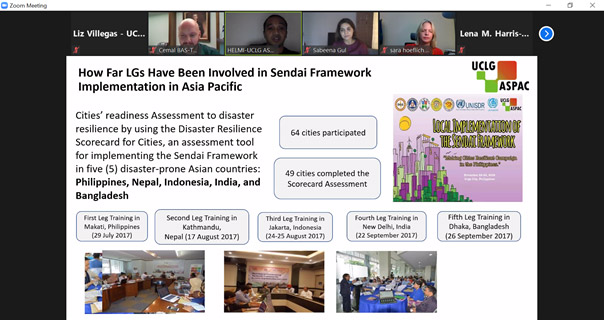17 June 2020 | UCLG ASPAC, member of the UCLG’s Capacity and Institution Building (CIB) Working Group, attended CIB annual meeting held virtually last 17 June 2020 and shared what the organisation has done to assist local governments within the Asia and Pacific region in facing the impact of COVID-19.
During the plenary session, Mr. Peter Knip, Director of VNG International and Chair of the CIB Working Group, recognised that the COVID-19 crisis has a huge impact on international cooperation work. Challenges include the limitations in travel and the refocusing of priorities to finance recovery programs of affected countries. Addressing the challenges will require a new narrative on what needs to be done together for the local government sector. Ms. Emilia Saiz, Secretary General of UCLG, added that the narrative needs to be stronger. She remarked that capacity building needs will be different from now on and the CIB Working Group needs to identify these shifts.
There were six simultaneous breakout sessions that discussed the following: 1) showcasing the impact of COVID-19 on vulnerable populations (including women and girls) in local communities; 2) building a common narrative: dialoguing with the international donor community and national governments on the role of local governments in the crisis response and aftermath; 3) adapting ongoing international programmes between local governments: from international travel to distant technical assistance; 4) stimulating local economies – how to enhance local economic development in the post COVID-19 context; 5) building back better: how to build resilience, while safeguarding local democracy and inclusive public governance?; and 6) exploring new options for financing international cooperation between local governments and how to access those.
In session 5, UCLG Learning Team raised that resilience is an important issue for the network and shared a learning module on urban resilience that is currently being developed. It includes four chapters: localising the Sendai Framework, understanding the fundamentals of resilience building, undertaking disaster risk reduction and resilience action, and the role of local and regional government associations. Mr. Helmi Abidin, DRR Specialist of UCLG ASPAC presented the section’s work on building local government capacity on DRR and local response to COVID-19. UCLG ASPAC worked closely with UNDRR and the LGAs especially from the five most disaster-prone countries in Asia, namely Bangladesh, India, Indonesia, Nepal, and Philippines, to localise the Sendai Framework through the Making Cities Resilient (MRC) Campaign. UCLG ASPAC also served as coordinator for the local authorities major group during the Asia-Pacific Ministerial Conference on Disaster Risk Reduction. Post-disaster rehabilitation for Palu City is also being facilitated by UCLG ASPAC together with Cities Unites France and UCLG. In response to COVID-19, UCLG ASPAC has organised a series of virtual discussions and published a guide for local governments to enable exchange of best practices. A representative from VNG International talked about The Mayors’ Game, a tool used in the crisis management training for Dutch mayors. In the game, the mayor will face a small crisis that grows as the scenario unfolds and the mayor has to decide on actions under the pressure of time. The game has been highly evaluated by mayors. It enabled them to play individually and learn collectively. Further discussions during the session emphasised the need to put systems in place for resilience.
In the wrap-up plenary session, each break-out session presented the highlights of their discussions. Mr. Peter Knip concluded the meeting with his statement that while the nearby future is uncertain, we have to act in order to protect and increase the message as a municipal movement in favour of strengthening capacities of local democracy.











